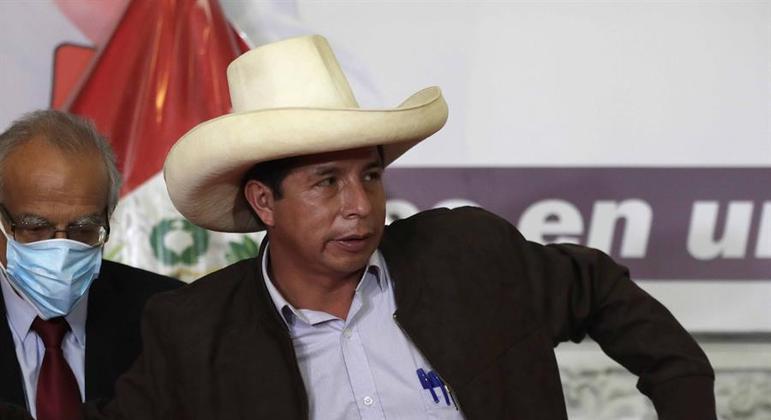RIO DE JANEIRO, BRAZIL – The official proclamation of Pedro Castillo as president-elect of Peru is imminent after the electoral juries have taken a month and a half to process and reject more than a thousand appeals and challenges from the right-wing Keiko Fujimori, who persists in denouncing without evidence an alleged “fraud”.
With only a week left for the presidential changeover, the National Jury of Elections (JNE) declared on Monday the last five appeals presented by Fujimori’s party, Fuerza Popular, were unfounded, which until now had prevented the electoral results from being made official.
Read also: Check out our coverage on Peru
This was confirmed to Efe agency by sources from the JNE, whose plenary has for the first time a free and unimpeded way to process the results submitted by each of the 60 special juries that make up the Peruvian electoral system, which is expected to occur in the next few hours.

In their resolution, they will foreseeably ratify the results of the scrutiny carried out by the National Office of Electoral Processes (ONPE), where Castillo obtained 50.12% of the valid votes, with a narrow margin of only 44,000 votes over his rival.
This small advantage was used by the Peruvian right-wing to emphasize the polarization of the electoral campaign and to lead the country to an unprecedented tension due to its refusal to admit the results, including exhortations to the armed forces to disobey Castillo, which in practice would be a coup d’état.
UNPRECEDENTED TENSION
During this period, demonstrations have taken place, especially in the capital, which on occasions have turned violent, as when last weekend a group of Fujimori’s supporters tried to reach the Government Palace in Lima, in the middle of the presidential candidate’s struggle with the electoral bodies.
Since the results of the election already anticipated her third consecutive defeat in a presidential election the day after the vote, the daughter of former president Alberto Fujimori (1990-2000), who was running under an accusation of more than 30 years in prison for alleged money laundering, cried “systematic fraud”.
In a strategy very similar to that used by Donald Trump in the last U.S. presidential elections, Fujimori attempted to nullify some 200,000 votes from Andean, rural and poor areas where Castillo had obtained overwhelming support, mostly for allegedly forged signatures that he could never prove.
Far from proving the allegations, numerous people allegedly affected by this fraud came out publicly to deny Fujimori and to reaffirm that the signatures on the electoral records were theirs.
At the same time, the legitimacy of the Peruvian elections was endorsed by organizations such as the Organization of American States and the European Union, as well as by the governments of the United States and Canada, among other countries and multilateral institutions.
HERMETIC CASTLE
Meanwhile, and in spite of not having the official proclamation, Castillo immediately began to consider himself the winner of the elections and to act as president-elect with meetings with different political leaders, businessmen, and diplomatic delegations from countries such as China, but without making public statements to journalists.
As he did in the final phase of his electoral campaign, Castillo has been hermetic and has not granted interviews beyond a brief statement to the foreign press where there was no option for questions.
Without an official proclamation, the handover of the administration, which is now headed by the interim president, Francisco Sagasti, focused on accelerating vaccination and guaranteeing the supply of vaccines against covid-19 until the end of the year, has not been able to begin either.
This means that Castillo and his team will have barely a week to take the reins of state before he shoulders the presidential sash on July 28, the same day the country will commemorate 200 years of independence.
PRIME MINISTER, THE BIG QUESTION MARK
For the time being, the professor from the northern Andean region of Cajamarca has stated that he will not anticipate the names of those who will be his ministers until the longed-for appointment from the JNE arrives, after rumors have started in the last hours with several names.
“They are transcendences and speculations. After the proclamation of the JNE we will make the corresponding official announcements for the government of the Bicentennial,” Castillo wrote in social networks.
Among the names that sound to integrate the Council of Ministers are the economist Pedro Francke and the physician Hernando Cevallos for the Economy and Health portfolios, respectively, but the main unknown is the prime minister.
On Sunday, the name of former congressman Roger Nájar, the head of the government plan of Perú Libre and close to the controversial Vladimir Cerrón, head of the party that declares itself Marxist and who has been convicted for corruption when he was governor of the Junín region, came to light.

